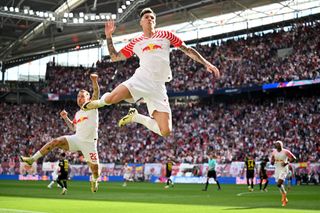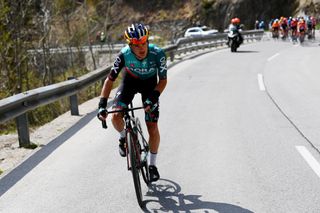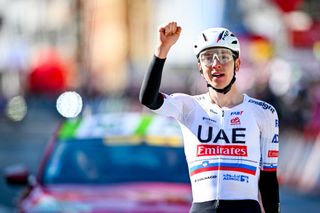At the turn of the new year, Red Bull was revealed as the latest high profile brand looking to come on board with a professional cycling team.
The plan became a reality this week as Red Bull was confirmed as the new majority owner and title sponsor of the German Bora-Hansgrohe team.
On the eve of the Giro d’Italia, team CEO Ralph Denk confirmed that the energy drink branding will appear on the team’s gear, including helmets, at this year’s Tour de France after he sold a 51% share of the team’s managing company.
Denk confirmed in a pre-race press conference that Red Bull-Bora Hansgrohe will have an increased budget and an under-23 development team moving forward as they aim to become the biggest, best and strongest team in the WorldTour.
The team acquired Primož Roglič from Visma-Lease a Bike during the off season, but Denk explained that winning the Tour de France with the 34-year-old was not the only big target.
“With the arrival of Red Bull, we have big, big goals but the Tour de France isn’t the only goal,” Denk said. “We want to be the number one brand, the most attractive brand in cycling. That’s the big goal for the whole project. We know we can’t do that in a few weeks but it’s the long-term approach of this project.”
But what else can we expect to see from the new Red Bull-Bora-Hansgrohe project? In an interview with Cycling Weekly, Denk expanded further on what can be expected from the ambitious new project and went inside the deal.
The latest race content, interviews, features, reviews and expert buying guides, direct to your inbox!
Red Bull philosophy & no more big money signings

(Image credit: Getty Images)
Many of Red Bull’s other sporting projects, particularly those in football, have centred on the importance of youth development and shaping players to a particular style of play.
Players like Bayern Munich’s Joshua Kimmich, and Liverpool’s Dominik Szobozlai started out at RB Leipzig before moving on to the Premier League and Bundesliga giants.
Denk explained that within reason, cycling fans can expect to see a similar philosophy at Red Bull-Bora Hansgrohe, particularly due to the team’s new under-23 development team.
“Definitely, we call it the rookie programme from under-19,” he said. “Even the scouting project is below under-19. Then we have our own under-19 team, GRENKE – Auto Eder, and our new under-23 team from next year on.
“I think that’s big proof of how important the whole rookie programmes are in the future for us. And yes, that’s part of the mission and vision from Red Bull.
“If you look to the current from Formula One field too, there are 20 spots within the bunch of cars, and 12 spots have a Red Bull history, from the Red Bull rookie programme, the drivers.”
Denk said that he felt spending big money was the quick and easy way to achieve success, and that the intrigue of a longer term project was part of what made the team so appealing to the energy drink giants.
“Our approach is not to go to someone like Tadej Pogačar now and buy him out of his contract,” he said. “So we will establish something of our own style from scratch. And yeah, it takes time but we have the time so yeah, we all just say let’s start the project.”

(Image credit: Getty Images)
In the initial announcement, Denk explained that Bora-Hansgrohe will literally have a wholly new identity from the Tour onwards with new branding, in line with their new owners, appearing on bikes, helmets and clothing.
Red Bull already were visible in men’s cycling due to individually sponsoring big name riders including the likes of Tom Pidcock and Wout van Aert. Both of the two riders, along with Bora’s own Anton Palzer, wear Red Bull branded helmets while competing and training.
Pidcock solely uses his Red Bull helmet for off road competition in both mountain bike and cyclo-cross. Van Aert very visibly wears a Red Bull helmet on the road.
Cycling Weekly understands that Red Bull-Bora-Hansgrohe’s new team helmets are likely to bear strong resemblance to those already seen elsewhere. Denk explained that he didn’t see an issue with other riders outside of his team wearing Red Bull branded helmets moving forward and that he didn’t feel it would raise a conflict of interest.
“I cannot speak for Red Bull,” he said. “But I don’t see that, not really, as a problem on that point. And yeah, it’s the decision of Red Bull, not my decision, but if this happens [Red Bull continuing with individual sponsorship], I’m fine with it.”
Investors away from the Middle East

(Image credit: Getty Images)
Reaching super-team status was always going to require significant investment from any potential new team owner. Only certain companies, countries or individuals are capable of providing such capital in the current international sporting market.
However, unlike other teams in the WorldTour like UAE Team Emirates, Bahrain Victorious and Jayco AlUla, Bora-Hansgrohe did not look to Middle Eastern investment.
Denk explained that any new owner, investor, or sponsor looking to do business with his team would need to be one that takes a holistic approach, and also one that ideally was close to home. With that considered it made Red Bull the perfect party to enter negotiations with.
“That’s the main reason why my feelings are so good with this,” he said. “And hopefully the whole team will also share that feeling soon. It’s a big add on, they [Red Bull] are from the same area where we are based. We speak the same language, the same dialect, and that feels much more comfortable as opposed to some external investor from far away countries.”
“In the last years, cycling has changed a lot, not just from the style of racing but clearly from the economic side as well,” he added. “And I, as an owner and CEO, had to take a decision regarding what we do.
“Do we go on with our currently stable partners, Bora and Hansgrohe, they are really fantastic partners and I’m super thankful to them… Or are we aiming for something big and looking for an investor? A lot of cycling teams already have an investor, some of them from Arabic countries, and for us we figured out what was best for us.
“They [Red Bull] visited us in the Tour and they saw how big the Tour is, how big our sport is, and how big the bike market is in general. I think they went a bit deeper for the marketing numbers in there and I think they were surprised how good they are so from that, the story starts.”

